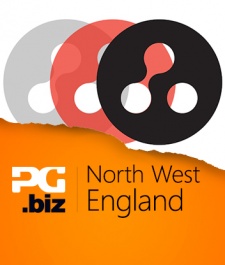Cheshire: Quiet, quaint, home to chocolate-box villages, historic market towns and, in recent years, scores upon scores of Manchester-based Premier League footballers.
From a gaming perspective, however, the county of Cheshire which hugs the bottom of the giant conurbations of Greater Manchester and Merseyside, bordering the scenic hills of North Wales is something of a powerhouse, largely down to one company.
Nestled in the east of the county sits the town of Macclesfield, home to the publisher that, throughout the course of this mobile generation, has pumped out some of the industry's biggest hits.
Yes, it may have been Finnish talent that brought Angry Birds to life, but it was Chillingo that actually enabled it to hit your iPhone, and Cut the Rope's Om Nom would have remained very hungry indeed without the firm's publishing expertise.
Sold to EA back in 2010, Chillingo has by industry standards become one of the North West's overnight successes, taking flight with the rise of iOS and serving as the go-to publisher for many an indie to this day.
We caught up with Edward Rumley, the publisher's COO, to find out more about its relationship with indies and, of course, its all-conquering owner EA.
"The COO of EA, Peter Moore, is from Liverpool so he's very familiar with the area and he's very happy that we're based here," Rumley opens.
"It almost brings a bit of home back to California for him."
Big hitter
Chillingo started life as an independent business itself, but came to EA's attention after publishing those two aforementioned iOS classics, Angry Birds and Cut The Rope.
Rumley says the key to the publisher's continuing success was to maintain its indie sensibilities after being acquired by EA.
However, Rumley - who previously worked at EA - noted that, in his past experience, working under the EA brand can sometimes be a double-edged sword.
"I spent several years signing content for EA from indie developers when the app stores first started," admits Rumley. "There were a huge amount of benefits to being under an EA brand but also certain disadvantages, not about the brand but about the culture of the business.
"The great thing about Chillingo is we really ring fenced the organisation and kept it true to what it is, a business that EA acquired for the purpose of independent developers. We haven't gone and changed the brand or the way that Chillingo works as a business."

Ed Rumley
So while Chillingo operates largely under its own steam, it does still dip into areas of expertise at EA to enhance the indie games that it publishes, often to improve monetisation or other areas where the developer has a small weakness.
Some indies could see this as EA meddling with their product, but Rumley says that this approach is specifically designed to benefit the developers.
"If we're commenting on the monetisation of a game it's not unusual now to put that game in front of the team that's working on The Simpsons or Real Racing 3," he contests.
"EA is obviously a large company with offices in Guildford, California and other parts of the world. Our business compliments EA's. We're part of that organisation and that skillset when we need it to be.
"We've got a very open dialogue with the rest of EA. A developer may come to us and we can go and get advice from the wider business. The Impossible Line is a game based funded by in-game advertising so we worked with EA's Global Media Sales team based in Redwood Shores to make sure we set up that game correctly to monetise for the developer."
Going global
Surprisingly, Chillingo doesn't actually make any specific efforts to support the mobile games development community in the North West of England.
As pitched, Chillingo is a global business, and the publisher uses the same approach for all of the studios it works with, whether or not they happen to be local.
However, when a local studio does come up with a game that catches Chillingo's interest, it'll be party to the same benefits as all of the publisher's other partners around the world, with the added bonus of face-to-face contact.
"We find games in all sorts of different ways but we're totally flexible, so if there is somebody based locally then we're absolutely happy to meet them, but some people are willing to fly halfway across the world just for a meeting in London. Some people are happy to come up to Macclesfield. Whatever works for the developer," says Rumley.
Current Chillingo hit The Red Space's Fright Heights

This approach to working with the needs of developers often means that if a developer doesn't need to meet Chillingo in person then they simply don't have to.
Rumley says it can sometimes be several years after a game is published before he meets a developer for the first time.
"We've got whole team of resource behind an indie developer. Often people are based in other countries and we don't get to see them," Rumley tells us.
"We've had number one games where about two years later we met the developer for the first time but we've always had an incredibly great relationship. That said, it's great to meet people locally and you can have a very different kind of relationship."
Despite not making a deliberate effort to support the local gaming community in the North West, Rumley is concerned about the recent collapse of the region's biggest studios, such as Sony Studio Liverpool.
He acknowledges that, on a personal level, to have so many talented developers out of work is no good thing, but this actually creates some benefits for the studios and publishers that continue to operate in the area, not to mention increasing the number of indie studios which might be potential partners for Chillingo.
"It's a real shame," he states. "I've been in this industry for 11 years and there are huge amounts of talent in the North West. It's a shame when so many great studios close down.
"The selfish upside is that we've hired some great people from larger companies such as Sony's Studio Liverpool and Infogrames. There's a great talent pool in the area. The other benefit is the increasing amount of indie developers out there. There are some studios with a lot of talent.
"If I was talented enough to make my own game that's what I would be doing. Whether they're coding in their spare time or not, they're making games."
Beyond mobile
One concern for the future of Chillingo working exclusively in mobile games publishing is the increasingly fashionable development of indie titles for Steam and PSn Vita.
With some new independent studios concerned about the risk of a mobile game never finding an audience, a publisher like Chillingo can bring obvious benefits in terms of visibility, but it is having to consider its options for the future, including some initial efforts to release games on a wider variety of platforms.
"The number of developers coming to us is always climbing," claims Rumley, "but publishing mobile content is difficult. There is a Californian gold rush and maybe people are beginning to realise that it is a difficult platform.
"I'm never going to say it's an easy platform to publish on because the fact is that it isn't. There are hundreds of apps a day launching, not just games but across all areas. The volume of content, it's always difficult to break through.
"That said, we recently published some content on the Vita so if people are moving in that direction, we can move as well. Right now our focus is on smartphone."
The other issue facing Chillingo's work with independent studios is the stigma that some attach to working with a big publisher, that some might see it as going against the independent spirit.
This is something that Liverpool's Lucid games and others have expressed concerns about. With the gap between large and small indies widening, Chillingo is working to understand these different developers.
"I understand the debate," says Rumley. "The gap is widening in all sorts of ways between what you might stereotypically define as an indie developer and a larger indie developer. Entirely different resources and attitude to the way that they're working.
"One or two people may join up across the world and be passionate about a game and make it whilst they've got a day job.
"That kind of business setup compared to a one or two hundred man studio can still be branded indie so I understand the debate, but there will always be indie developers, however you define that."
Future Chillingo hit, Damp Gnat's Icycle: On Thin Ice
So as long as there are indie developers, Chillingo vows it'll be around to support them, on mobile and potentially elsewhere in the future as well.
The North West of England provides a fascinating picture of the games industry in microcosm, with once successful big studios giving way to smaller new companies publishing on all different kinds of platforms.

It also shows the huge variety of games that are possible on mobile, from massive graphical powerhouses like Lucid Games' 2K Drive, to smaller puzzle games like Greenfly Studios' Drop That Candy.
Perhaps of most note, however, is the region's penchant for games education, training up the next batch of superstars to ensure that it's not just Chillingo that has the power to reach out from the North West and touch gamers across the globe.





















